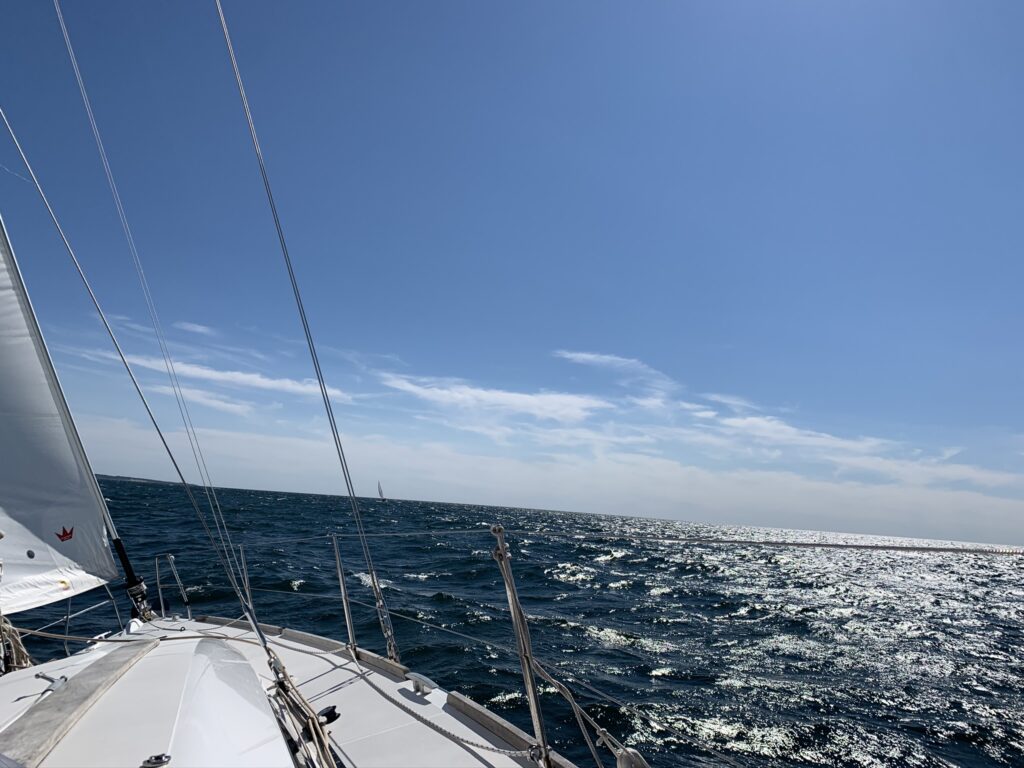
This summer, some sailing buddies and I chartered a boat in Newport. As with other charter experiences I’ve had, it was spectacular.
Adam and I were co-skippers on this one, and it was thoroughly planned. Upon our return, we jotted down this list of things to think about next time around based on our experience.
This is not an exhaustive bareboat charter planning or passage making guide. Think of it as short addendum to the many guides available both in print and online.
General Principals
- Be prepared to roll with it. Make plans and backup plans. Diverge from plans. Make new plans. In general, be on the conservative side since this is probably a new vessel for you and your crew.
- Don’t be afraid to make decisions, and stick to them—within reason. You may need to deliver bad news to the crew regarding weather related changes to itinerary etc, but this is the skipper’s lot.
Planning

- Don’t be too aggressive on the itinerary, keep the passages to less than 20 nm if you are a sailing crew, less if there are non-sailors aboard. Sailing on a schedule is tough if not impossible, and a charter by it’s nature is time boxed. Plan day zero and the last day thoroughly. Plan to be back at base or very, very close to it the night before the last day. What comes between those two days will need to be flexible (see points one and two, above).
- Provide packing lists and any other instructions for crew as soon as possible before the trip. Remind them a few times about them this might increase their chances of reading them.
- Nail down the provisioning list in detail, with quantities, before sending anyone to the store. It’s wise to have the person who prepared the list among the provisioning party in case there are questions. Having a little extra of this or that is fine, especially snack items. But extra meat and produce will likely get unceremoniously tossed on the last day, and that’s a shame. On the other hand, don’t want to run out of essentials so plan meals out and make the list detailed. Then break it down by department for easier shopping. Also, see the NO GLASS ON DECK point below. This should be taken into account while shopping.
- Everyone on the boat should have navionics on their phone and a solid understanding of how to use it. The helm might need a quick consult at any time. Don’t depend on the boat’s chart plotter having up-to-date (or any) maps loaded.
Aboard

Always do a safety/boat briefing ASAP with the whole crew, no matter how experienced you or they think they are. In addition to safety, topics that need to be covered include:
- Water conservation, drinking and otherwise. Not everyone is familiar with the concept of a sailor’s shower or washing dishes without running the water the entire time.
- Electricity conservation. Most of us are used to having ample power available all the time, that is not the case aboard. Try to charge phones etc. while the engine is running. Turn off things that are not being used.
- Cleanliness, everybody should Always Be Cleaning. Keep your personal items on you, or in your berth, not in common areas. Put trash in trash bags. Don’t go for another drink without discarding your empty. While we’re on this subject, make sure your empty is empty–that’s just good form.
- NO GLASS ON DECK, no exceptions. Wine is fine, leave the bottles in the galley. This means no bottled beer, cans only. The lack of luxury here will be appreciated when it comes time to remove trash.
- Make sure everyone knows how to quickly turn that motor on and engage the drive. Which will mean letting everyone drive in an open area early.
Under Weigh

- Talk through, or have the crew member talk through what they are going to do in their position before maneuvers (mooring, docking, hoisting/dousing sail, etc.). This is especially important if you haven’t sailed together on this type of vessel or if their experience level with the maneuver is unknown. Stakes are higher in some roles (e.g helming during almost any maneuver or handling a spring line while docking). Everyone should communicate their plan and backup plan accordingly before things get started.
- Good communication between bow and driver when mooring. This will usually mean making sure the helm knows what’s happening up front right when the person on the bow is busiest. Agree on some hand signals and post somebody amidships to relay when those fail.
